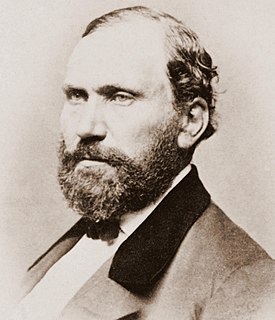
The Eleventh Amendment to the United States Constitution was passed by Congress on March 4, 1794, and ratified by the states on February 7, 1795. The Eleventh Amendment restricts the ability of individuals to bring suit against states in federal court.

The Federal Government of the United States is the national government of the United States, a federal republic in North America, composed of 50 states, a federal district, five major self-governing territories, and several island possessions. The federal government is composed of three distinct branches: legislative, executive, and judicial, whose powers are vested by the U.S. Constitution in the Congress, the President, and the federal courts, respectively. The powers and duties of these branches are further defined by acts of congress, including the creation of executive departments and courts inferior to the Supreme Court.

Separate but equal was a legal doctrine in United States constitutional law according to which racial segregation did not violate the Fourteenth Amendment to the United States Constitution, which guaranteed "equal protection" under the law to all people. Under the doctrine, as long as the facilities provided to each race were equal, state and local governments could require that services, facilities, public accommodations, housing, medical care, education, employment, and transportation be segregated by race, which was already the case throughout the states of the former Confederacy. The phrase was derived from a Louisiana law of 1890, although the law actually used the phrase "equal but separate".
Gitlow v. New York, 268 U.S. 652 (1925), was a decision by the Supreme Court of the United States holding that the Fourteenth Amendment to the United States Constitution had extended the reach of certain limitations on federal government authority set forth in the First Amendment—specifically the provisions protecting freedom of speech and freedom of the press—to the governments of the individual states. It was one of a series of Supreme Court cases that defined the scope of the First Amendment's protection of free speech and established the standard to which a state or the federal government would be held when it criminalized speech or writing.
United States v. Cruikshank, 92 U.S. 542 (1876), was an important United States Supreme Court decision in United States constitutional law, one of the earliest to deal with the application of the Bill of Rights to state governments following the adoption of the Fourteenth Amendment.

The issue of voting rights in the United States, specifically the enfranchisement and disenfranchisement of different groups, has been contested throughout United States history.
Minor v. Happersett, 88 U.S. 162 (1875), is a United States Supreme Court case in which the Court held that the Constitution did not grant anyone, and in this case specifically a female citizen of the state of Missouri, a right to vote even when a state law granted rights to vote to a certain class of citizens. The Supreme Court upheld state court decisions in Missouri, which had refused to register a woman as a lawful voter because that state's laws allowed only men to vote.

The Equal Protection Clause is a clause within the text of the Fourteenth Amendment to the United States Constitution. The clause, which took effect in 1868, provides "nor shall any State [...] deny to any person within its jurisdiction the equal protection of the laws".
Incorporation, in United States law, is the doctrine by which portions of the Bill of Rights have been made applicable to the states. When the Bill of Rights was ratified, courts held that its protections only extended to the actions of the federal government and that the Bill of Rights did not place limitations on the authority of state and local governments. However, the post-Civil War era, beginning in 1865 with the Thirteenth Amendment, which declared the abolition of slavery, gave rise to the incorporation of other Amendments, providing more rights to the states and people over time. Gradually, various portions of the Bill of Rights have been held to be applicable to state and local governments by incorporation through the Fourteenth Amendment in 1868 and the Fifteenth Amendment in 1870.
Strauder v. West Virginia, 100 U.S. 303 (1880), was a United States Supreme Court case about racial discrimination and United States constitutional criminal procedure. Strauder was the first instance where the Supreme Court reversed a state court decision denying a defendant's motion to remove his criminal trial to federal court pursuant to Section 3 of the Civil Rights Act of 1866.
Craig v. Boren, 429 U.S. 190 (1976), was the first case in which a majority of the United States Supreme Court determined that statutory or administrative sex classifications were subject to intermediate scrutiny under the Fourteenth Amendment's Equal Protection Clause.
Ex parte Young, 209 U.S. 123 (1908), is a United States Supreme Court case that allows suits in federal courts against officials acting on behalf of states of the union to proceed despite the State's sovereign immunity, when the State acted unconstitutionally.
Seminole Tribe of Florida v. Florida, 517 U.S. 44 (1996), was a United States Supreme Court case which held that Article One of the U.S. Constitution did not give the United States Congress the power to abrogate the sovereign immunity of the states that is further protected under the Eleventh Amendment. Such abrogation is permitted where it is necessary to enforce the rights of citizens guaranteed under the Fourteenth Amendment as per Fitzpatrick v. Bitzer, 427 U.S. 445 (1976). The case also held that the doctrine of Ex parte Young, 209 U.S. 123 (1908), which allows state officials to be sued in their official capacity for prospective injunctive relief, was inapplicable under these circumstances, because any remedy was limited to the one that Congress had provided.

The Privileges or Immunities Clause is Amendment XIV, Section 1, Clause 2 of the United States Constitution. Along with the rest of the Fourteenth Amendment, this clause became part of the Constitution on July 9, 1868.

Afroyim v. Rusk, 387 U.S. 253 (1967), is a major United States Supreme Court case in which the Court ruled that citizens of the United States may not be deprived of their citizenship involuntarily. The U.S. government had attempted to revoke the citizenship of Beys Afroyim, a man born in Poland, because he had cast a vote in an Israeli election after becoming a naturalized U.S. citizen. The Supreme Court decided that Afroyim's right to retain his citizenship was guaranteed by the Citizenship Clause of the Fourteenth Amendment to the Constitution. In so doing, the Court struck down a federal law mandating loss of U.S. citizenship for voting in a foreign election—thereby overruling one of its own precedents, Perez v. Brownell (1958), in which it had upheld loss of citizenship under similar circumstances less than a decade earlier.
United States v. Guest, 383 U.S. 745 (1966), is a United States Supreme Court opinion, authored by Justice Potter Stewart, in which the court extended the protection of the 14th Amendment to citizens who suffer rights deprivations at the hands of private conspiracies, where there is minimal state participation in the conspiracy. The Court also held that there is Constitutional right to travel from state to state.
United States v. Williams may refer to any of the following United States Supreme Court decisions:
Sugarman v. Dougall, 413 U.S. 634 (1973), was a case before the United States Supreme Court.
Loss of rights due to criminal conviction refers to the practice in some countries of reducing the rights of individuals who have been convicted of a criminal offence. The restrictions are in addition to other penalties such as incarceration or fines. In addition to restrictions imposed directly upon conviction, there can also be collateral civil consequences resulting from a criminal conviction, but which are not imposed directly by the courts as a result of the conviction.









